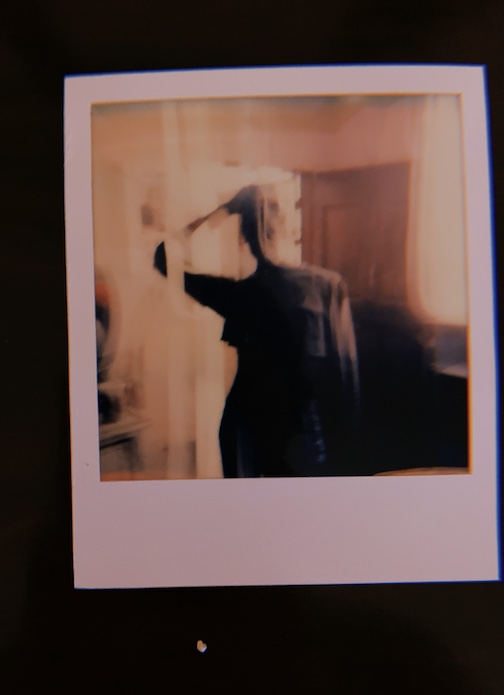Graduate Research Reports
Lola Loustaunau and Polet Campos-Melchor each received a 2020 CLLAS Summer Research Grant.
From Disposability to Collective Care: Experiences of Migrant Essential Workers during the COVID-19 Pandemic
By Lola Loustaunau, PhD candidate, Department of Sociology
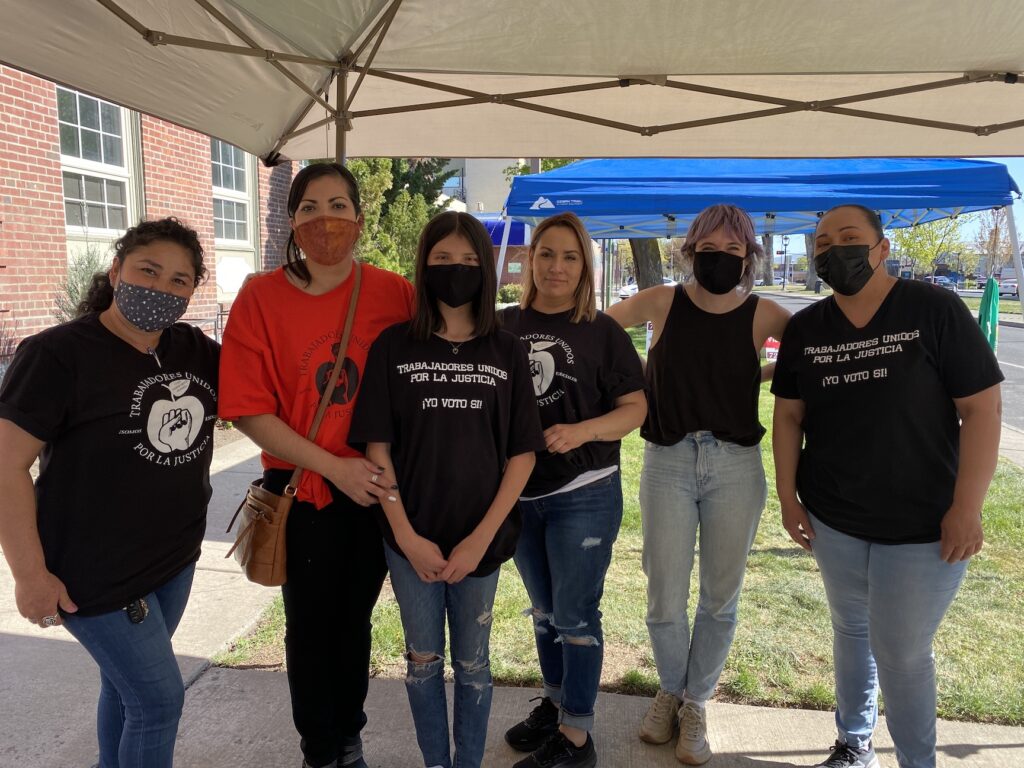
At the time I was about to begin the field work for my dissertation, COVID-19 became a worldwide pandemic. The workers whose experiences are the focus of my research—migrant women employed in the industrial processing of food including fruit, vegetables, meat, and baked goods—suddenly made national headlines as their workplaces became sites of some of the biggest virus outbreaks. As their situation rapidly changed, so did my own work: the research questions, the data collection methods, and my goals as an activist-scholar.
Working conditions in the food processing industry have historically been poor: long and physically demanding workdays, unpredictable schedules, low wages, and the highest accident rate in manufacturing. As outbreaks led to spikes in the number of infected workers (Dyal 2020; Lakhani 2020; Taylor, Boulos, and Almond 2020), industry and government responded by attempting to maintain the status quo, further deregulating the sector and failing to mandate any protections against outbreaks or infections (Commissioner of Food and Drugs – 2020; Memorandum United States Environmental Protection Agency, 2020; Executive Order 13917 2020).
Food processing workers soon realized that while their work was essential, they were not. Expected to continue working with little or no protective gear, they faced increased workplace risks, new caregiving responsibilities at home, and limited access to public support or healthcare.
It was at this time that workers started organizing. Conversations on the processing line soon turned into Facebook groups and Whatsapp chats as a platform to share information about the virus, about who was getting sick, what the plant managers were doing or saying, about how to navigate a fragmented benefit system that was ill prepared to aid workers during this crisis. Workers reached out to organizations, advocates, and journalists.
Family members got involved: wives and husbands worried about their partners, young teens worried about their non-English speaking parents, neighbors worried about each other. I soon found myself joining these conversations, going to Zoom meetings with other advocates and organizers, and trying to figure out what my role as a researcher could be. While hesitant at first, I quickly understood that registering the workers’ experiences and their organizing efforts was important not only as part of a broader discussion on the U.S. food supply chain, but because helping workers to get their stories out could have immediate impacts on their situation.
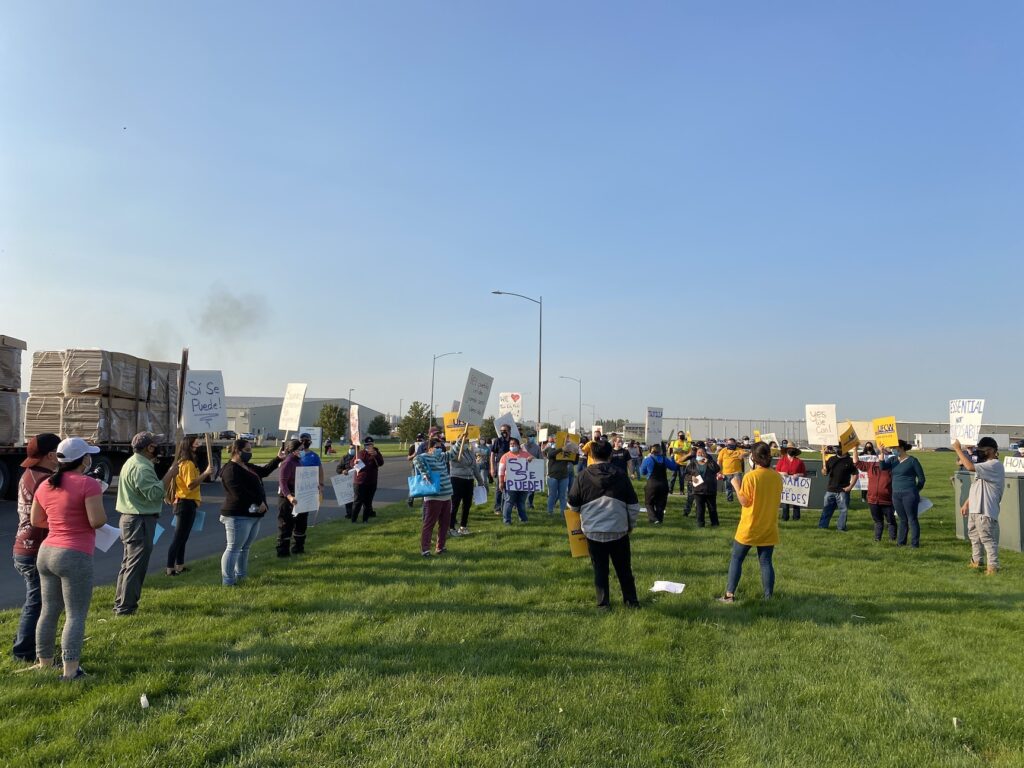
Certainly, doing research during the COVID-19 outbreak had great challenges. For safety reasons I couldn’t do in-person actions with the workers until October; yet in the months prior, I spent most of my time trying to get in touch with workers and organizers, doing phone interviews, and collecting online data. Unlike my previous experiences doing qualitative research, this time around things were put together remotely.
By the time I was able to travel to the sites where most of the organizing was happening, I had established closer relations with some workers and organizations, so my work focused on expanding those connections. I participated in rallies and community forums, went to workers’ homes and met their families, attended testing events, and volunteered at vaccination clinics. I loaned my translation skills and transferred resources from the university to these communities by compensating workers for their time spent collaborating on my research. Instead of focusing on writing an academic article or a chapter, I prioritized putting together a public policy oriented report, which became the basis of my testimony at the Washington State Legislature when the food industry’s pandemic response was under discussion, and which I later presented alongside many of the workers over Zoom.
I found that discourses about essential work did not necessarily translate into making workers feel like heroes, but actually quite the opposite, with many expressing that they felt “disposable.” However, I also found that workers translated this feeling of disposability into an opportunity to struggle for better working conditions and to build new and expansive communities of care.
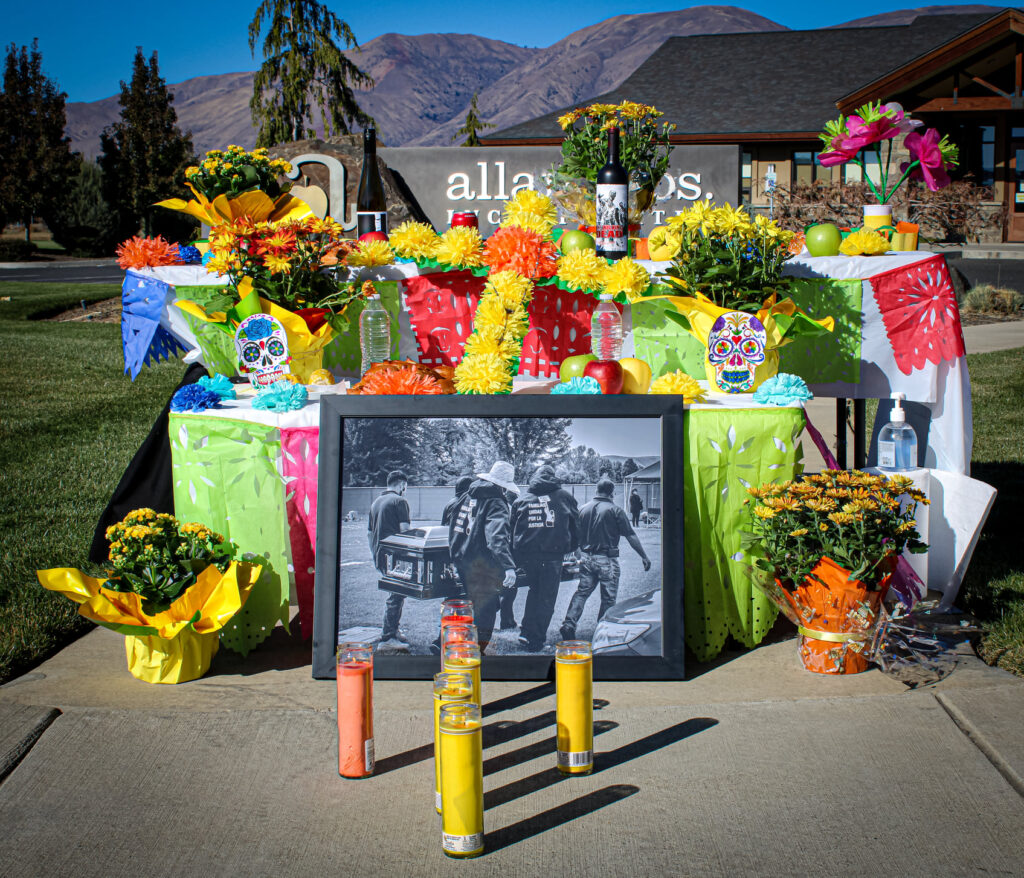
Through my research I captured how workers at different plants experimented with different forms of resistance and organizing: from creating online groups to help each other apply for benefits, to massively walking out of their jobs, to striking for several weeks, to starting their own unions or joining existing ones. Workers built spaces for mourning their co-workers and processing the loss they were collectively experiencing. They helped each other by making and sharing masks and hand sanitizer, preparing food, and coordinating pop-up vaccination clinics and know-your-rights’ trainings. They expanded their networks and built alliances with farmworkers, grocery workers, and multiple community organizations. In so doing, food processing migrant workers reverted the feelings of disposability, fear, and anger brought by the employer’s response during the pandemic and created spaces of collective care. These actions also brought new emotions, this time allowing workers to feel strong, beautiful, energized, and excited.
Based on this insight, in my dissertation I argue that unpacking the affective dimension of their working conditions and their collective organizing allows for seeing how these workers turned fear and anger into courage, and how they defied the structural oppression that had rendered them disposable. By highlighting the emotional dimension both of disposability and the struggle against it, we are able to gain a deeper understanding of what the past year has been for these workers in the front lines and how they have struggled, and continue to struggle, for their survival and the survival of their communities.
Lola Loustaunau is a Ph.D. candidate in the Department of Sociology. Her research focuses on precarity, low-wage migrant workers, emotions, and collective organizing. She has received several awards for her dissertation work and will be a Wayne Morse Graduate Fellow for AY 2021-2022. She has recently co-authored: ‘No choice but to be essential: expanding dimensions of precarity during the COVID-19’ (Sociological Perspectives, 2021) and ‘Impossible choices: how workers manage unpredictable scheduling practices’ (Labor Studies Journal 2019). For a longer report on her work, “Essential Work, Disposable Workers.”
Reciprocity in Conducting Fieldwork in Ciudad Juárez
by Polet Campos-Melchor, PhD Student, Department of Anthropology
After my 2019 summer fieldwork at Respetttrans, a trans asylum seeker shelter in Ciudad Juárez, I was inspired to return in summer 2020 to create a lotería with the community and a transfronteriza artist. The pandemic made the return impossible. While my summer 2019 fieldwork examined trans asylum seekers’ practices of care and mutual aid during their experience with the Remain in Mexico Policy in Ciudad Juarez, my 2020 summer fieldwork was set to document the lives of trans asylum seekers being celebrated in Juárez. With the support of the Center for Latino/a & Latin American Studies, I was able to finalize transcription from my 2019 research and conduct ten follow-up interviews with my interlocutors. This resulted in my master’s paper, submitted to the Department of Anthropology and approved in December 2020. In this newsletter post, I share an introduction to my 2019 summer fieldwork and how the lessons moved across borders and relations.
About a week into my fieldwork in Juárez, I met Grecia, a mother and nurse and the Rarámuri and Mennonite “mother” of Respetttrans. I had walked through Calle Hospital’s streets with Dr. Yolanda Leyva and Gabriela Muñoz, arriving at a bright pink house with a rainbow and trans flag hanging from the roof. This was Respetttrans, where Grecia had been awaiting our arrival. A tall, pale woman with nineties-style rolled bangs and warm brown eyes, Grecia welcomed us into the space. An active member of the LGBT community in Ciudad Juárez, Grecia told us that her goal is to keep LGBTQ+ migrants off the streets and get them into homes where they feel safe and welcome.
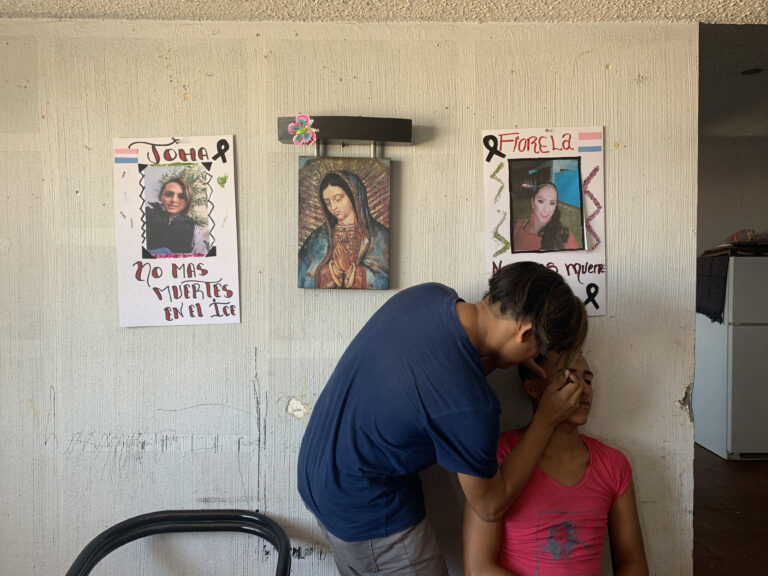
By working towards building a reciprocal relationship with the LGBT+ community in Ciudad Juárez, I set my intentions on working closely with Respetttrans. Along with this feeling of caring for the house members came the responsibility of returning. After my first visit, I was tasked with bringing back items for the house members. Grecia asked for a new set of clothes for Leslie, a recent deportee, as well as a change of clothes for the two young boys of the house. Wily, a gay boy, also asked for a soccer ball. Two days later, I returned with all the items. One of the women was surprised that I had returned; she said reporters and other visitors do not.
Respetttrans is and continues to be a site that is frequented by nonprofits and government agencies who ask the residents about their struggles and repay them with a meal for their stories. There was a case when representatives from three different organizations arrived at the house on the same day. Community members said they felt like the house was a zoo and they were the animals. Although the girls joked, the sincerity in their eyes showed that they were hurt.
In another case in mid-August, I witnessed first-hand how rare it was for the autonomy or consent of migrants to be acknowledged. I was sitting in the living room with Courtney, Michele, Leslie, Minerva, Aneliz, and Andrés talking about foods we missed from home. Courtney was lying on one of the couches, closely watching Pose on my phone. Andrés continued to bring up chicken gizzards. When three guests entered with Grecia, we suddenly found ourselves in a group interview. The visitors were from an organization in the United States and were looking to fund spaces in Ciudad Juárez. I noted that consent for an interview had not been sought but presumed.
After that particular witnessing of the lack of consent or care given to the house members, I began to take photos of them on my polaroid to provide them with immediate copies. The women would pose, take pictures of each other with my camera, and then use the photos to decorate their living spaces. As I continued to visit them, I learned that collaborative relationships in the field require care and mutual support that center celebrating queer lives in the present.
Polet Campos-Melchor is a PhD student in the Department of Anthropology and Graduate Certificate student in the Department of Women’s, Gender, and Sexuality Studies at the University of Oregon. Her research explores how trans and lesbian migrants and scholars articulate and narrate strategies of love and care, expanding beyond only the imaginary into tangible strategies of survival. Polet is also a UO Promising Scholar. Her research has been funded by the Tinker Foundation, the UO Center for Latino/a and Latin American Studies, and the UO Center for the Study of Women in Society.
________________________________________________________________________________________________

